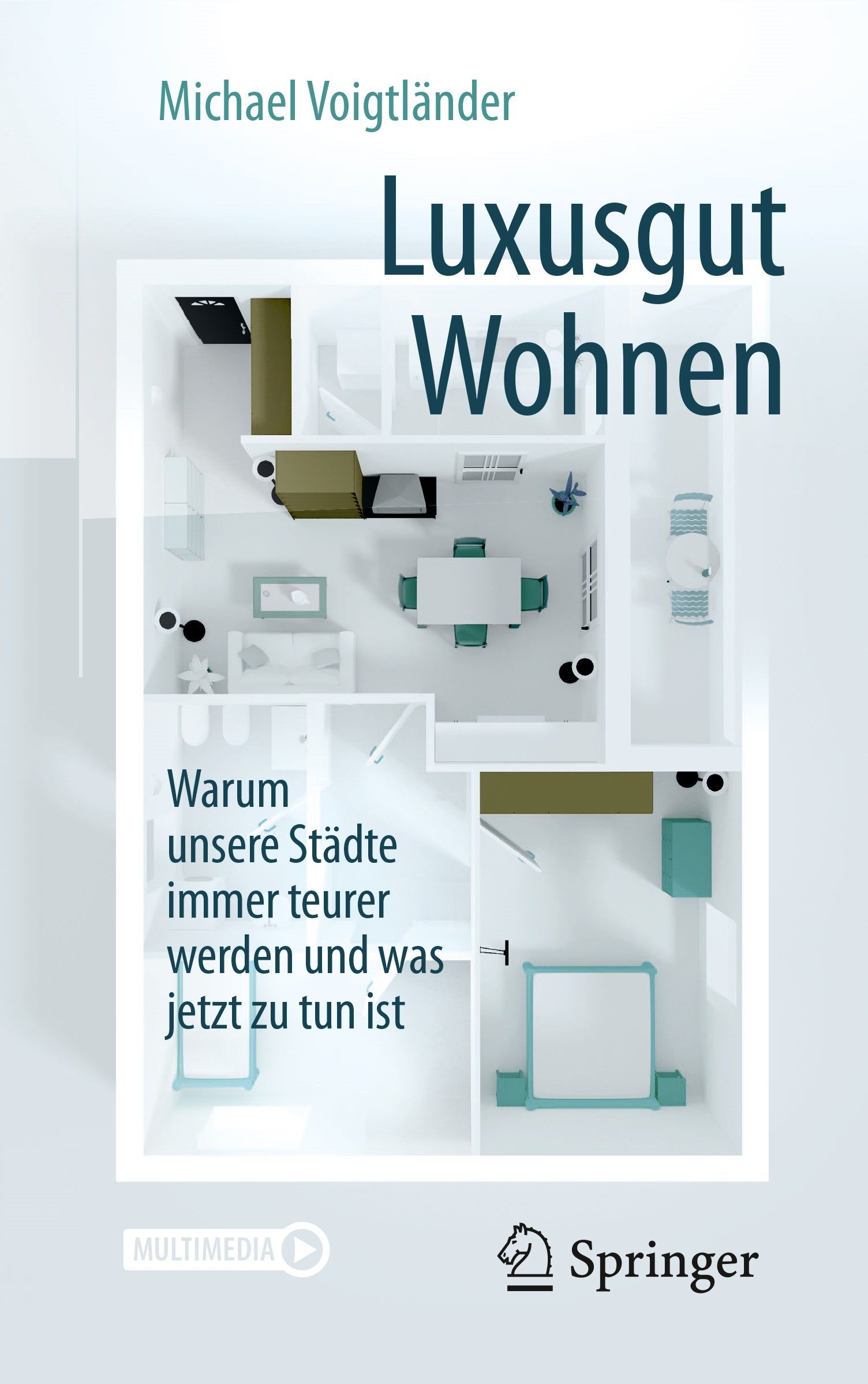How do we want to live in the future? Is owning your own home still suitable as retirement provision? And how will the interest rate turnaround affect the real estate market? Answers from Michael Voigtländer, real estate expert at the German Economic Institute.
Your own house with a garden in the countryside – this has been most people’s dream home for decades. How do people want to live today?
The dream of owning your own home continues unabated. It still represents prosperity and self-determination. And the longing for a detached single-family home remains surprisingly strong, as shown by our current study for Germany: It is considered the preferred form of housing, followed by a terraced house. Very few want a condominium. However, the locational preferences have changed. People are still drawn to the conurbations, but the surrounding areas have become more attractive. Fast commuting routes, a good infrastructure, a wide range of leisure activities and high-speed Internet remain important requirements for locations.
Young people are increasingly trying out new forms of housing such as micro-apartments, cluster living or co-living with large communal spaces. Will Generation Z revolutionise the way we live?
I’m quite sceptical. Of course there are some who would like to live differently, but deep down many people want to be able to retreat. Studies show that young people also want to have their own four walls. And preferably not just an apartment, but their own house with a garden.
Will the trend towards working from home and mobile working lead to an urban exodus and thus to a renaissance of the provinces?
Working from home tends to make a larger area around major cities attractive. If you only go to the office twice a week, you are prepared to accept a longer commute. This requires a good infrastructure with schools, daycare centres, high-speed Internet and cultural offerings, which are still lacking in many places. But we do not expect to see a rush to the countryside. New service jobs are being created in cities and are attracting highly qualified young people. There is also a growing group of active seniors who also prefer an urban lifestyle.

Property prices have risen in many European cities over the past decade. You describe the reasons for this and possible solutions in your book “Luxusgut Wohnen” (living as a luxury). Is housing becoming the social issue of the 21st century?
No, I think that’s an exaggeration. There were hardly any rent increases during this period for existing tenants. In addition, there is a high vacancy rate in rural areas in Germany, as well as in Switzerland and France. So it is not a general social problem. But the situation remains challenging for those looking for a new home in the conurbations – around 10 percent of the population.
Why is the market failing to meet demand for housing?
Investors are keen to build, but there is a lack of building land. There are several reasons for this. On the one hand, the municipalities are holding back as they are afraid of the infrastructure investments resulting from large residential construction projects. On the other, the “not in my back yard” problem is becoming increasingly apparent. As soon as a project is planned, opposition arises within the neighbourhood. Objections are raised on grounds of environmental protection, biodiversity or noise, which can seriously delay construction activity. So there is a conflict between those who want to move to the city and those who are already there, who say they don’t want any building activity or increase in density, as that just creates more strain for us. I don’t think this conflict is being approached in an entirely honest way.
In what sense?
As a society, we should seriously ask ourselves: What do we want? Do we want more housing and therefore more affordable housing? Or would we prefer to keep the cities as they are now – and thus close them up to newcomers and young people with new, fresh ideas?

What’s striking is that significantly fewer people own residential property in Switzerland (42%) and Germany (50%) than in other European countries (e.g. France: 64%). Why is that?
There are historical reasons for this. In these two countries, a liberal housing market was promoted at an early stage and a balance was struck between landlords and tenants.
In other European countries, on the other hand, the housing market was heavily regulated after the Second World War by means of rent freezes and extreme protection from eviction. This made it impossible for landlords to pass on renovation costs to the tenants. As a result, many people sold their houses instead of renovating them, because it was no longer worthwhile.
Is a high home ownership rate even desirable from an economic perspective?
It’s important to have both. An excessively high home ownership rate is problematic, since many people sometimes get very heavily into debt and take financial risks, which can lead to problems, as the recent subprime crisis showed. In addition, rented apartments increase mobility, which is beneficial for the labour market as people are more likely to relocate. Residential property, on the other hand, provides good security for retirement. In addition, assets are more evenly distributed in countries with a higher home ownership rate.
In view of the rising prices, the dream of owning your own four walls is increasingly becoming a distant prospect. What needs to be done to enable younger people to afford real estate too?
These days it is almost impossible to own a home without an inheritance or an advancement of inheritance, which is fuelling divisions in society. It should therefore be a social responsibility to lower the hurdles for future owners. And there are certainly suitable instruments to do so. In Belgium, for example, first-time homebuyers benefit from tax advantages. Anyone who buys a property for their own use in the Brussels region receives an allowance of EUR 175 000 on land transfer tax. In the Netherlands there is credit risk insurance for mortgage loans. On the one hand this creates planning security, and on the other, banks are able to require slightly less equity capital from their customers due to the increased security.
Are there also any interesting private approaches?
Yes, for example in France, where employers provide their employees with loans to buy their own home. This is also in their own interests. Skilled workers are more sought-after than ever before, and if a company helps its employees to own a home, this creates a strong attachment to the location and increases the chances of retaining the best skilled workers.
Is a home still suitable as retirement provision?
Residential property is becoming an increasingly important component of retirement provisions, especially as statutory and occupational pensions are only generating low returns. A property offers many courses of action – even if it is often assumed that it mainly involves a cluster risk. For example, you can partially remortgage when you reach retirement age, or you can sell it and pay rent again with the capital gained. Residential property ultimately creates value that you can use. And the younger you are when you buy, the more you benefit from the advantages.
The financing situation is currently changing, with interest rates rising and real wages falling due to inflation. What does this mean for living?
I suspect there will be more demand for smaller spaces in the future. Preferably smaller areas that still have enough rooms – that’s certainly one adjustment strategy. Demand for very small apartments in good central locations is also set to grow.
Is there a threat of a subprime debacle in Europe, should interest rates rise massively in the future?
In countries such as Switzerland, Germany, Austria and France I would say no, because these countries usually have long fixed interest rates, and mortgages are usually repaid properly. If you have long-term fixed-rate mortgages, you can manage fairly well. On the other hand, countries with shorter, variable interest rate fixing, such as Spain or the UK, might find it more difficult.
Finally, the question on everyone’s lips: How does a real estate economist actually live?
Like many people, our desire to own our own home grew when we started a family, and we were able to buy a house in 2007. But not in Cologne where I work, but a bit further away in Leverkusen, where the prices are more moderate. This, too, is a reality of the housing market. Housing is a consumer good. Some want more of it, others want less. We have to let go of the idea that everyone in the city centre can find a cheap property.

Michael Voigtländer
Michael Voigtländer is Head of the Financial and Real Estate Markets Research Unit at the German Economic Institute in Cologne and Honorary Professor of Economics at Bonn-Rhein-Sieg University of Applied Sciences. He is one of the most cited economists in Germany and the author of several books, most recently “Luxusgut Wohnen. Warum unsere Städte immer teurer werden und was zu tun ist.” (Living as a luxury: why our cities are becoming more expensive and what to do about it). (Springer Verlag).





